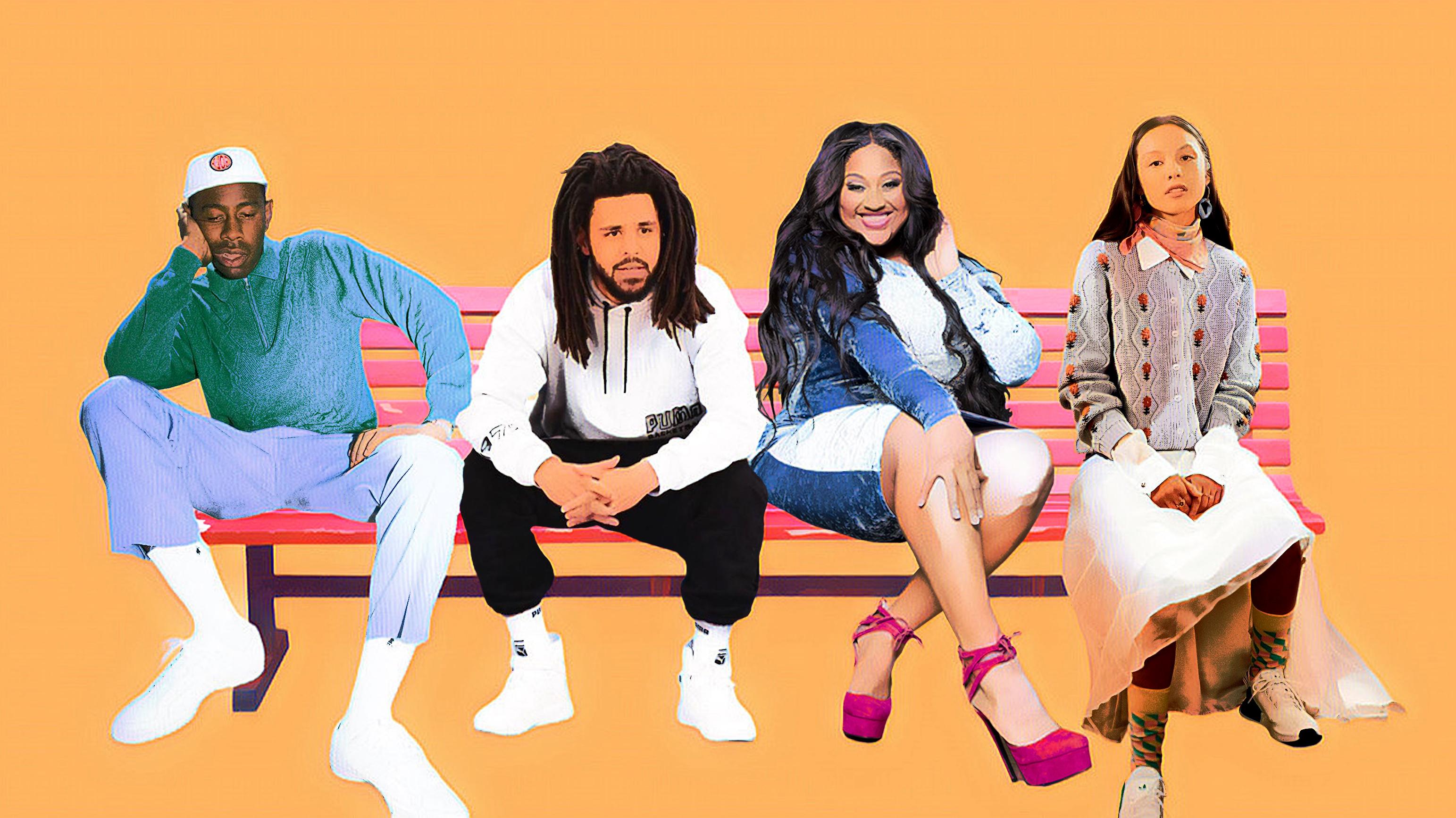
Is the album dead? These 10 projects from the first half of 2021 would argue otherwise. From Olivia Rodrigo’s breakout to Tyler, the Creator’s return to form to J. Cole’s Magic Johnson turn, we’re counting down what’s captivated us so far this year. And be sure to check out Tuesday’s episode of The Ringer Music Show to hear more of our “best ofs” for 2021.
10. Playboi Carti, Whole Lotta Red
I loathed Whole Lotta Red. When Playboi Carti’s third album—or maybe second, who honestly knows—arrived on Christmas Day, it had all the makings of one of the most insufferable projects of the year. The long-delayed project was overstuffed, unfocused, filled with streaming bait features, and low on the hits and meme potential that filled his previous work. In short, it was in line with most Playboi Carti albums. Then, as I walked outside fuming at the amount of time I’d wasted on a Playboi project on my day off, it hit me. The cheesy organ melody of “Vamp Anthem” filled my headphones and this audacious album began to make sense.
Whole Lotta Red is pure camp. For more than an hour, Playboi creates a musical mausoleum that splits the difference between cheesy horror synths and faux-Atari beeps strung together into semi-coherence. The hooks are post-catchy, the ad-libs are far more interesting than the lyrics, and at no point does Playboi bother to make anything accessible. For much of the album, he wants to rap from the perspective of a narcoleptic rock star vampire misunderstood by the world and, in many ways, that’s exactly where Playboi exists in the current rap landscape. Whole Lotta Red could’ve cemented Playboi as rap’s next megastar, but instead Carti decided to slouch further into his artistic desires. And that’s more than you can say about most 2021 rap. —Charles Holmes
9. Madlib, Sound Ancestors
For once, Madlib let someone else flip his records into something. The legendary producer and crate digger behind Madvillian, Lootpack, and two excellent Freddie Gibbs collaborations has made a career out of repurposing fragments of sound into vibrant compositions, but for Sound Ancestors, he let longtime associate Four Tet sift through his digital archives and shape a full-length project. There was just one rule: Four Tet could work only with what was there—he couldn’t add anything. Based on the results, he didn’t need to. From Shades of Blue to the Madlib Medicine Show installments, there’s no shortage of interesting instrumental projects in the prolific beat smith’s oeuvre, but Sound Ancestors is the closest he’s given us a true producer’s project. It’s stunning and emotive on tracks like “Road of the Lonely Ones” and the Afro-jazz closer “Duumbiyay,” hypnotic when he samples Young Marble Giants on “Dirtknock,” and joyous as it pays tribute the late, great James Yancey on “Two for 2 - For Dilla.” Sound Ancestors shows that even the greatest producers can benefit from getting another set of ears involved. —Justin Sayles
8. AllBlack, TY4FWM
The city of Oakland is going through a transformation unlike anything seen in the past 60 years. Historic homelessness, rising rents, and a disappearing middle class have led to a revolution of sorts. D’Andre Sams, better known as AllBlack, is speaking for every one of the voiceless waiting to be heard. On songs like “Ride” and “Save Me,” he speaks of the hopelessness of someone who doesn’t see a way out. Few artists can summon the spirit of Tupac on wax, but AllBlack did it twice with “War Stories” and “How I Feel,” which both sample songs from All Eyez on Me. On both tracks, he invokes the late rapper’s soul and reminds the world both artists walked the same Town blocks. With other features from Bay Area OGs G-Eazy and E-40, as well as Mozzy, Peezy, and P-Lo, this seems to be Black’s coming-out party, and there’s an even bigger follow-up expected. —Logan Murdock
7. Mach-Hommy, Pray for Haiti
Is Mach-Hommy a rapper or an urban legend? He doesn’t want you to see his lyrics, and also would prefer for you to not see his face, and given his monotone style, there seems to be at least a chance that he may not exist at all. Listening to Pray for Haiti, Mach’s most recent and best album, is a personal experience in the way that watching the ocean or reading a book can be. What makes the sea move or who wrote the text matters far less than the fact that there are waves present and pages to be explored. But it takes a certain level of glory to stop us from at least wondering.
This is a rapper’s record facilitated by the upstate New York verbalist and curator Westside Gunn. In line with previous sample-based (but largely percussion-less) releases from bar obsessives Roc Marciano and Gunn’s Griselda clique, Pray for Haiti welds lyrical fanaticism with the craft of entendre-making. It’s a sly piece of work accompanied by a soundscape that buzzes and croons and broods. Mach leans into the legend on more than one occasion (“Mach-Hommy brought a choppie just to iron out the wrinkles”) and never once falters. Does that make this the work of a man or something more? —Lex Pryor
6. Modest Mouse, The Golden Casket
No, this isn’t the Modest Mouse that college-age sad boys and girls fell in love with in the late ’90s and early aughts, and it’s also not quite the Modest Mouse that broke through to the mainstream with “Float On” and “Dashboard.” But Isaac Brock and Co. have returned with a new record that feels authentic to them at this stage of their career while managing to recapture what made them great. After a relative misstep with 2015’s Strangers to Ourselves—best described as a MM paint-by-numbers—The Golden Casket finds Brock mining his paranoia and fears about technology, but ultimately arriving at a hopeful place. So while the nearly six-minute “Transmitting Receiving” plays like a manifesto, “Wooden Soldiers” and “We’re Lucky” are among the most optimistic things he’s ever committed to tape. As Modest Mouse rounds out its third decade as a band, that optimism is welcome, even if it’s cautious. —Sayles
5. J. Cole, The Off-Season
“This shit too easy for me now.”
Thirty seconds into his sixth LP, Cole makes it clear who is the best around here. “Bitch, my pen to the paper’s lethal,” he growls on “95 South,” “I’m sendin’ ’em straight to meet / The nigga that made them, peep the reaper.” But the man who used to brag about going platinum with no features is also content with deferring to his guests: He teams up with Lil Baby on the confessional “Pride Is the Devil,” where he cops to a promethazine addiction after describing the perils of fame: being the primary breadwinner at 26, owning five homes, all the while living up to every sky-high expectation he faces. Cole brings on 21 Savage on “My Life,” where the Atlanta MC grapples with fame, his complicated relationship with love, and remorse. Throughout the album, Cole channels Magic Johnson: He’s so good at facilitating that it makes him the best player on the floor. He’s the maestro of this project, and everyone is following his lead.
Cole has been at the center of a couple of public missteps over the past year, which were followed by some valid criticism (oh hey, Noname). Worse, his responses felt weak and confused. On this album, while still not 100 percent right, he seems more assertive in his quest to learn. This album has everything you’d want from Cole. He’s back in his pocket, putting together an album that’s among the best projects of his career. —Murdock
4. Lucy Dacus, Home Video
I can’t remember the last time a song brought me to tears on first listen, but Lucy Dacus softly singing, “That’s where we disagree”—so polite, so benign, so heartbreaking—on a deceptively gentle near-lullaby called “Christine” did the trick. For her third (and best) album, the singer-songwriter raided her teenage diaries for intimate (and gargantuan) odes to Vacation Bible School drama, adolescent crushes, and her earliest inklings of who she really loves and who might love her back. Dial in to her wavelength—a bedroom-folk hush poised, at any moment, to explode into a festival-demolishing roar—and every line will hit with freight-train force and precision, no matter how seemingly benign (or not). Dacus softly singing, “I would kill him / If you let me,” is pretty goddamn heartbreaking too. —Rob Harvilla
3. Olivia Rodrigo, Sour
“Teenagers,” one of the 21st century’s most beloved poets once wrote, “scare the living shit out of me.” You don’t gotta be up on the High School Musical: The Musical: The Series romantic catastrophe that fuels 18-year-old Olivia Rodrigo’s ferocious pop-supernova debut; you don’t even gotta be 18 (or 28! or 38!) yourself to revel in the ecstatically vicious barrage of wounded and oft-chart-topping breakup songs (“Deja Vu” > “Drivers License”; “Traitor” > “Good 4 U”) that burst with thrilling Lorde Crashes the Warped Tour energy and ensure that “I’m so sick of 17 / Where’s my fuckin’ teenage dream?” is just one of dozens of killer lines from (already!) another one of the 21st century’s beloved poets. Think of her the next time you have trouble parallel parking. —Harvilla
2. Jazmine Sullivan, Heaux Tales
Of all the places where good things go to die, Tinder is highest on the list. For Jazmine Sullivan the godforsaken app is a microcosm of something more: a symbol of who we are in the absence of love. On “Girl Like Me,” she begins her story where we all do in the wake of a breakup, by creating a new dating profile. But it’s what comes after that proves the most devastating. “Knew it was real when you blocked me / Now I sit at home judgin’ my body,” she sings on the second verse.
Heaux Tales is filled with these moments, ones that ache and sting like an exposed nerve. Throughout the 14-track project, Sullivan invites her friends and collaborators to tell stories of lust, betrayal, misogyny, and ambition in a way that’s rarely offered to most female protagonists. And before, between, and after these interludes Sullivan is able to weave her own story. Her voice soars with indignation as much as it quivers with sadness. One moment she’s reminiscing about not knowing who she went home with and the next threatening to take a partner off the lease.
In so many ways, Heaux Tales is the most vividly human album of the year. The problems are messy—so too are the solutions—but in the middle is Sullivan merely content to figure it out with the listener. She might not be the savior in this particular tale, but her story is easily the most captivating. —Holmes
1. Tyler, the Creator, Call Me If You Get Lost
A maker is a mix of many things—a comingling of brilliance, contradiction, letdowns, and come-ups. Tyler, the Creator makes dope and cinematic music, and he also seems to understand that the dueling impulses swelling within him—heretic and apostle, influencer and influenced—are not features to be ironed out but, rather, the point of creating in the first place. You can change and be who you want to be, and who you were will be (for both good and bad) a part of that too. Best not to let it drown you.
I don’t quite know how else to describe Call Me If You Get Lost than as a perfectly imperfect product of that same mastery and escapism. The album is celebratory and brash, owing partially to the boastful serenades of DJ Drama of Gangsta Grillz fame, and even more to the fact that Tyler Okonma decided to rap again. Blink and you’ll miss him spasming like Kendrick on the hypnotic “Runitup,” or spitting (quite literally) like Missy on the careening “Lemonhead.” And still there is no way to miss the verbal workmanship of “Lumberjack” or “Massa” or, really, any other moment on the record that isn’t a bridge, a hook, or a feature from another rapper, also rapping their ass off.
That is not to say that Call Me If You Get Lost isn’t mournful or self-pitying in the way of Igor or warm and flirty in the way of Flower Boy. There are glimpses of both, sonically and thematically. The album is a bit harder and also, in spots, a bit groovier. Tyler still loves his chords and synths. What sets it apart is the willingness to disclose. On Call Me If You Get Lost he knows what to give and what not to. It is a record made by an artist in full control of their sound and aware of the fact that sound is the only thing in life that they’ll ever have full control over. —Pryor

